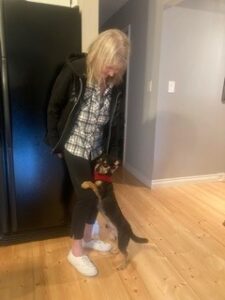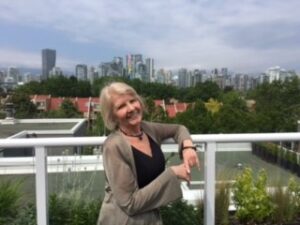
Marilyn Pederson has just adopted a rescue dog—a dachshund mix named Billy. He had, since his rescue from a California shelter, been placed in a number of foster homes, but the little dog—who was living as a stray and suffers from anxiety—couldn’t cope with the various scenarios he was met with. Until he found Pederson.
“He’s in the perfect place now,” she said. “I know that you can’t treat trauma with trauma.”
Pederson, from Gibsons, speaks from experience. She’s a survivor of childhood trauma and spent much of her adult life trying to push that trauma aside.
It wasn’t until she was urged by her physician to enroll in mindfulness and health coaching programs that she realized just how big of an impact that trauma had on both her mind and her body.
“I didn’t have a clue about how all of that affected my health and my body and my mind,” Pederson said. “I thought that stuff in the past had nothing to do with what’s going on today. Then it became clear my health was never good. There were migraines, there were other health problems. I must have driven a lot of doctors crazy because I was like ‘fix me’.”
 “I learned through the physician facilitators about how much I could control about what was going on with me. To know myself and to learn just how breathing can change a mind frame and change how your body reacts. I’ve got chronic back pain and my whole attitude was, ‘I’ll ignore this and I’ll be tough.’ Now I’ve learned to accept that the pain is there and to find ways of making it better.”
“I learned through the physician facilitators about how much I could control about what was going on with me. To know myself and to learn just how breathing can change a mind frame and change how your body reacts. I’ve got chronic back pain and my whole attitude was, ‘I’ll ignore this and I’ll be tough.’ Now I’ve learned to accept that the pain is there and to find ways of making it better.”
I learned through the physician facilitators about how much I could control about what was going on with me. To know myself and to learn just how breathing can change a mind frame and change how your body reacts. I’ve got chronic back pain and my whole attitude was, ‘I’ll ignore this and I’ll be tough.’ Now I’ve learned to accept that the pain is there and to find ways of making it better.
Marilyn Pederson
And now, a new research paper published in the Oxford Academic Family Practice Journal in September, provides insight into why the programs—which have been used in the community of Gibsons and the wider Sunshine Coast since 2013—have been so helpful to patients like Pederson.
Dr. Rahul Gupta, one of the program facilitators and authors, hopes that the research into integrating mindfulness and health coaching into the primary care system will encourage other communities to embed them into care and, ultimately, lead to more people benefiting from them.
“It’s so important and so lacking in our system. There’s been a long history of relying on pharmaceutical interventions with chronic diseases of mind and body—and not exploring the power of more participatory, empowering ways of medicine. I hope this paper supports and inspires other rural healthcare providers to explore how they might benefit their own rural communities.”
The programs see individuals with various health challenges ranging from mental health issues like depression and anxiety to chronic pain and heart conditions being referred by their family physician for complementary physician care. Patients were referred to the Modified Mindfulness Based Stress Reduction (MBSR) program, or to 1:1 health coaching, or both. There were 334 physician referrals for MBSR from the start of that program in 2015 to the end of the study period in 2018 and 433 physician referrals for health coaching between 2013 and 2018.
Dr. Gupta said that he saw benefits from the program early on, corroborating what’s known in the literature. “We were seeing significant drops in symptoms. We could have a heterogenous group of people, but they could all access these tools to support themselves.”
Results of the study revealed how these programs were working. Accessibility was a key factor; because they were referred to the program by their doctor, it helped patients who may not have otherwise sought a mindfulness program or health coaching. Dr. Gupta said: “There’s this trust between patient and provider that can be leveraged to reduce stigma.” Participants also described the group setting as helpful because they could see that no matter what walk of life people were from, they had common struggles and there were common solutions.
A surprising result was finding that the programs may work through addressing provider distress. Dr. Gupta added: “I think the part that really interested me was that the referring providers themselves felt supported and felt they were contributing to a more whole-person response. They said it made their job easier and made them feel more satisfied for their patients.”
I think the part that really interested me was that the referring providers themselves felt supported and felt they were contributing to a more whole-person response. They said it made their job easier and made them feel more satisfied for their patients.
Dr. Rahul Gupta
To learn more about this study, written and carried out by Dr. Rahul Gupta, Dr. Maureen Mayhew, Dr. Robert Woollard, and Karen Gelb, visit the Health Coaching and Mindfulness page on the UBC Centre for Rural Research site.
Key Messages from study of Modified Mindfulness Based Stress Reduction and Health Coaching in Gibsons
-Embedding programs into Medicare (no point-of-contact cost) improves accessibility.
-Physician facilitators reduce stigma and further enhance accessibility.
-Offering a toolbox of skills in a safe environment are key factors for success.
-HC and MFN programs promote a shared sense of humanity and whole-person care.
-Integrating these programs into primary care may help address physician burnout.
Dr. Rahul Gupta will be presenting his mindfulness and health coaching research at the BC Rural Health Research Exchange on Tuesday, Nov. 23, 2021. Sign up as a participant to hear more about this research and other topics, including research on community engagement, virtual health, transportation and more. Visit the website for registration details.


